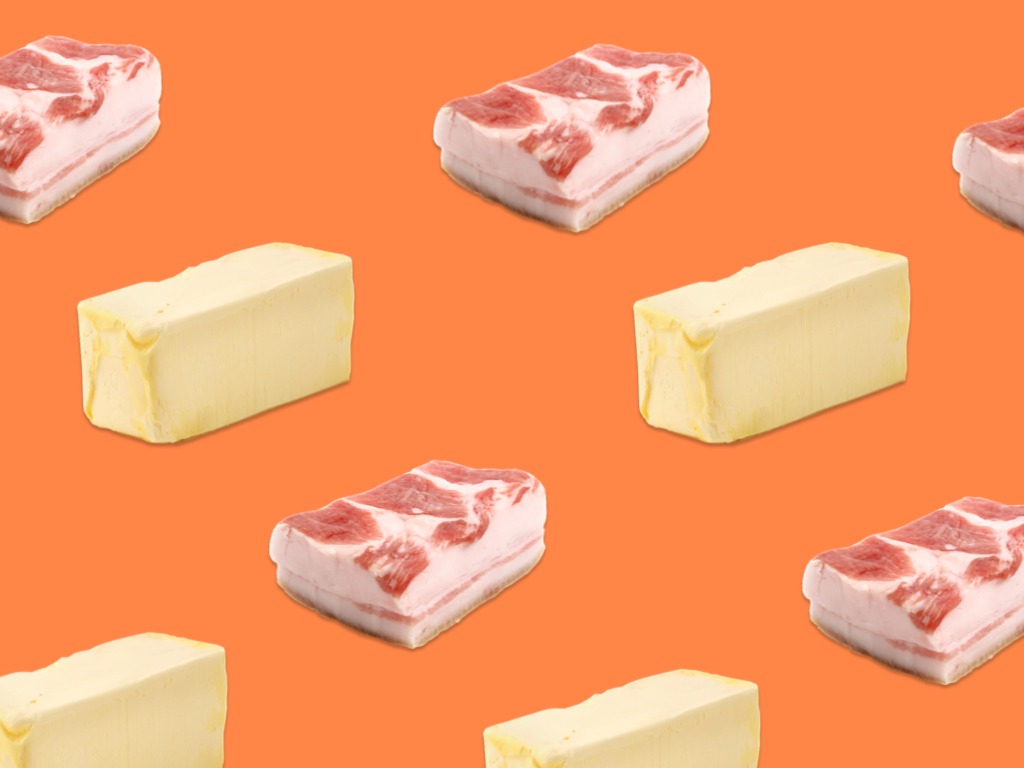The Dirty Business Of Fats And Why Alternatives Are Key To Future-Proofing Our Food System
7 Mins Read
A handful of startups around the world are pioneering new ways to produce the fat we all know and love, and unlocking a more sustainable food system in the process.
Fat is an important, but often misunderstood, core macronutrient. It plays a key role in creating food’s flavor, mouthfeel, and nutritional value. With a growing global population that needs to be fed sustainably and equitably, one thing is for sure, decreasing fat production is unrealistic, and shifting from palm and soy to other vegetable oils or doubling down on animal fat production is not the answer. This is where alternative fats come in. A handful of startups around the world are pioneering new ways to produce the fat we all know and love, and unlocking a more sustainable food system in the process.
The global fat breakdown
Each year, 221.5 million tons of fats and oils are produced globally, a yearly average of 27 kg per person. The UN predicts that by 2030, the world will be home to 8.5 billion people and this will balloon to 10.4 billion by 2100. Ensuring food security for such a large population means we need to produce at least 280 million tons of fats and oil by the end of the century. Many food system experts, myself included, do not believe this is possible with our current production systems.
Currently, around 50% of global fat production is derived from soybean and palm fruit oils, followed by other plant oils (25%), animal meat-derived fat (13%), and dairy-derived fat (12%). The most expensive fats to produce are animal fats – reaching over $10/kg; the cheapest are palm and soy oils – which can cost as little as under $1/kg. Cheaper vegetable oils dominate the market, while animal-based fats are more niche and mainly embedded in meats. Even applications where animal fats were once popular, such as fast food frying, are being phased out. McDonald’s, for example, stopped frying its fries in beef tallow in 1990 (yes! McDonald’s fries are technically vegan!).
The phasing out of animal-fat frying primarily occurred due to pricing and health concerns; however, the environmental impact of the switch was a big added plus. Sheep and beef fat production create almost 14g of CO2-eq per kcal produced; comparatively, plant-based counterparts such as palm oil, soy oil, coconut oil, and cocoa butter produce 1.5g of CO2-eq per kcal.
In addition, vegetable oils such as palm oil have the advantage of being incredibly efficient. As the highest-yielding vegetable oil crop, palm produces 36% of the world’s oil while using less than 9% of croplands devoted to oil production. If global oil were solely supplied from palm, the world’s dedicated land would be around 77 million hectares, four times lower than the current figure for all oilseed crops.
Am I saying vegetable oils are the best solution? No, but given the existing alternatives, they come out on top from an environmental perspective – although it’s certainly a nuanced situation.
The palm oil question
While palm oil is efficient, versatile, and cheap, its criticisms are well-documented. Palm oil production is infamous for its devastating impacts and continues to be a significant contributor to deforestation, social conflict, and human rights violations.
The Roundtable on Sustainable Palm Oil (RSPO) was founded in 2004 to tackle this. As of today, it remains the world’s leading voluntary certification scheme. And yet, this industry watchdog is constantly criticized by activists and industry insiders for its ineffective auditing system.
The EU’s Regulation on Deforestation-free Supply Chains aims to close some of the loopholes left open by the RSPO with regard to greater traceability and sustainability., In parallel, concerted government action and private and public efforts in Indonesia, the world’s largest palm oil supplier, have led to a decline in deforestation over the last decade; in 2020, for example, it fell 75% to its lowest level since records began in 1990.
Indeed, statistics like this are encouraging, especially considering a global boycott of palm oil would just increase agricultural land use for other, less efficient crops. But, equally, as with any agriculturally produced oil or fat, be it palm, soy, or coconut oil, there is no risk-free option.
Food system fragility
Recent conflict and supply chain issues have exposed our global food system’s fragility and highlighted the importance of making it more resilient and robust.
Take Indonesia as an example; as the world’s biggest palm oil supplier it holds a third of the total global export share. Which is why in 2022, when it banned palm oil exports to protect local stores, the knock-on effect was severe Global edible oil markets were shaken, and global food prices skyrocketed due to palm oil being an ingredient in 50 percent of all packaged goods.
Similarly, Russia and Ukraine, which are currently at war, are together responsible for producing and exporting over two-thirds of the world’s sunflower oil; the conflict led to an abrupt shortage.
Elsewhere, in South America, where half the world’s soybean production resides, a prolonged drought has slashed production.
This is the danger of a highly consolidated food system, it creates import dependency, and it’s a system that most detrimentally affects developing nations and net food importers. As a result, in recent years, a handful of countries have made greater food sovereignty a political priority.
Singapore’s food resilience map includes its ’30 by 30′ goal, which aims to sustainably produce 30% of the nation’s nutritional needs locally by 2030. Meanwhile, the UAE is gearing up to be the next food tech hub in the Middle East, recently launching its Food Tech Valley and implementing a National Food Security Strategy 2051 -with tech playing an increasingly key role. Not everyone is receptive, though. Italy, for example, recently banned cultivated meat and other synthetic foods, citing the preservation of Italian food heritage.
Regenerative farming methods are also re-emerging in oil and fat production, cited by some as key to solving the climate crisis. However, the question around regenerative practices is whether they’re scalable. So far, techniques, as they relate to palm oil production, have only been tested on small-scale oil farms, while research on mixed-use farms shows that yield increases per palm, not per hectare.
In addition to scalability issues around regenerative agriculture, self-sufficiency in edible oils in macro-regions is a tall order, with land availability, variance in technology and natural resources, and climate all key challenges. Moreover, self-sufficiency does not equate to food security. It’s clear we need to think creatively.
Innovation in the alt-fat space
In the last five years, a growing number of players have been contemplating this oil and fat production predicament and moving toward production with minimal agricultural inputs.
Precision fermentation and cell cultivation are increasingly pegged as techno-fixes in this area.
The former is a refined form of brewing, which uses biotechnology to program genetically modified microorganisms to produce fats. The latter involves extracting cells from animals or plants and growing them in sterile containers with controlled temperature and light intensity.
A third approach has emerged of late: the thermochemical approach, which converts CO2 into fat through the power-to-x concept. It uses just three ingredients: CO2, water, and electricity.
These alternative approaches are revolutionary because they have the capacity to decouple yield from land use and lower GHG emissions, while – if thoughtfully framed in decentralized business models – addressing the current food system fragility.
A variety of companies in the space are applying these techniques to alt-fat and alt-oil production to create products on zero-acre farms, as it were, which incidentally is the name of one of the companies creating cultivated oil through fermentation. Likewise, Clean Food Group is working on a Bath University-developed yeast-based alternative to palm oil, created through unique fermentation processes to produce a palm oil substitute from lignocellulosic waste.
C16 Biosciences is doing similar work with its Palmless product, and NoPalm Ingredients uses fermentation technology to turn waste feedstocks into microbial oil. Circe Bioscience is another company betting that the future of food is fermentation.
Elsewhere, Cubiq is developing cultivated fats and omega-3-rich cell-based oils; Lypid microencapsulates liquid plant oils in water to create its ‘PhytoFat, and Mycorena has made the world-first fungi-based fat through fermentation.
Green-On and Savor, where I work as the Director of Business Development, are developing zero-carbon fats via the thermochemical approach. We utilize CO2 from the air and hydrogen from water, and then we heat them to create carbon-hydrogen chains; finally, we blend them with oxygen to form fat molecules.
There’s certainly no lack of innovation and inspiration in the alt-fat space. But for many, a few key questions remain unanswered, especially as these startups move beyond the pilot stage. Are these technologies scalable? What about price parity? Will consumers trust (and consume) fat produced in these novel ways? And crucially,, what are the unintended consequences of transitioning to these new production methods?
As with everything new and pioneering, visionaries see their mission as nothing short of world-changing. And while we have a ways to go, from where I’m standing, these alt-fat companies are a key solution to future-proofing our food system.




